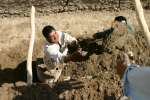How UNHCR helps to change young lives on Lesvos
News Stories, 11 January 2016
LESVOS, Greece, Jan 11 (UNHCR) – Whenever Huda Al-Shabsogh, a UNHCR field officer on the Greek island of Lesvos, entered the closed facility for unaccompanied minors at the Moria reception and registration centre for refugees, scores of children erupted in excitement.
"Auntie! Auntie!" they shouted happily in Arabic. "How are you today?"
Although Huda cared for dozens of new children each month, she knew all of them by name. Most were young boys aged 14-17, though she saw girls, too.
The majority stayed on the island for a few days to a few weeks, until UNHCR – along with partner NGOs and the Greek authorities – could help them find individual solutions.
"All of them needed advice, but sometimes they just wanted to chat," said Huda. "They are very, very scared when they reach here."
Huda is normally based in Amman, Jordan, where she is a UNHCR senior community services associate. She was temporarily posted to Lesvos to do similar work assisting the most vulnerable refugees, such as the disabled, single mothers, people with medical issues, or unaccompanied and separated children.
With colleagues, she identified and arranged for their individual protection needs, such as special housing or health services.
On Lesvos, her first UNHCR posting outside Jordan, Huda focused on unaccompanied children. (Huda completed her UNHCR assignment on Jan 3 and has returned to Jordan. Other UNHCR staff continue her work.)
The process of identifying minors begins on the island's beaches, where hundreds of refugees and migrants land each day after taking the short but dangerous 10-kilometre boat crossing from Turkey. Volunteers, aid workers for numerous NGOs, and UNHCR protection officers work together to find them among the arrivals.
Many minors declare they are adults in order to avoid being placed in closed centres by Greek and other European authorities for safety. The minors often consider it as a sort of detention as they are not free to come and go.
This makes identifying them particularly challenging. For this reason, there are no completely reliable figures on how many unaccompanied minors arrive on the Greek islands.
However, child refugees in general are on the rise. According to UN statistics, children now make up one in three of the refugees and migrants passing through Greece, skyrocketing from one in 10 earlier this year. From January to September, they lodged a record-breaking 214,000 asylum claims across Europe.
Once minors are identified on Lesvos, UNHCR protection officers arrange a bus ride to Moria, one of the island's two main reception and registration centres for refugees.
Huda was the last link in that identification chain. She received them at the gate, where they were transferred to the closed facility under the control of Greek authorities.
The Moria closed facility for minors does indeed resembles a detention centre, with high wire fences and barred windows. Huda would visit several times during the day, chatting and joking with the children until she coaxed out smiles and laughs. Her presence calmed them, despite the conditions.
In Moria, the children receive food, medical care, psychosocial support and legal advice from a constellation of UNHCR's NGO partners, including PRAKSIS, METAction, Save the Children and Doctors of the World.
Huda interviewed the children to determine their individual protection needs and helped them decide what to do next, ensuring they understood their choices. Some will stay in Greece and apply for asylum. Others are reunited with family members elsewhere in Europe via official channels.
One day in November, Huda scrolled through the WhatsApp application on her smartphone. It was filled with messages and photos of children who have come through Lesvos and checked in with her along the route to northern Europe, a journey she advised them not to take.
One boy in particular, a 13-year-old named Abdul-Kafi from Aleppo, Syria, sent her voice recordings every day.
"When he left [Moria] he said, 'Please, consider me as your son'," Huda said as she played some of his recordings. "When he reached Athens, he called on WhatsApp and said, 'Hello auntie, I'm good.' Now he is in a camp in Germany."
Many children experience trauma after all the fighting and violence they have witnessed in their home countries of Syria, Iraq, Afghanistan and elsewhere. But the journey to Europe is frightening too. For example, the Aegean Sea crossing to Lesvos is the first time many refugees have been on board a boat and can be especially distressing for minors traveling without their parents or caretakers.
Particularly young or vulnerable children are transferred to a special apartment run by PRAKSIS in Mytilene, the island's main city, until they are deemed stable enough to continue to Athens.
"Some of them had been alone for one to three weeks," Huda explained. "They came hungry, exhausted and scared. They saw the police and thought they would be sent back to Turkey. There was a language barrier. So once they met someone who spoke Arabic, I could see it in their eyes, 'Finally, someone understands me'."
Sometimes she saw dramatic improvements in just one day. With some, a warm meal, a change of clothes and a full night's rest worked wonders. Other children took much longer to work through their fears or just wanted return home to their families.
Huda spent extra time on those children. "It was a lot like being a mother," she explained. She has three children herself back in Jordan – a daughter and two sons.
"I told them 'You are about to change your whole life'," she said. "'You need to be cautious, organized and thoughtful about your future'."
By Tania Karas in Lesvos, Greece




















































